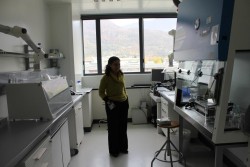SINE2020 to facilitate the study of the human body: Interview with Deuteration task leader Giovanna Fragneto
Lipids are molecules widely present in nature as for instance in our body’s fats that keep us warm. Given their presence in organisms, lipids are becoming ever more popular among scientists, representing a very large fraction of research in biology and soft-matter with neutrons. Giovanna Fragneto, who is the head of the Large Scale Structures and Soft Matter Science and Support groups at the Institut Laue-Langevin (ILL) in Grenoble, leads the task on “Extraction and purification of small molecules from deuterated cell cultures” of the SINE2020 Chemical Deuteration activity. In an interview she explains how this work will contribute to advancing science. What are the aims of your task within SINE2020? Deuteration is a technique that allows scientists to see samples with better contrast during neutron measurements. There is thus a great need for deuterated material. In the last few years we have been using natural materials like lipids but they are not easy to synthesise due to their complex structure. Our aim is to improve the procedure for lipid production so that we can provide large scale production to the user community, which would also reduce costs. Why do we need deuterated lipids? Deuterated lipids are very useful to better understand the human body. For instance, they can be used by scientists using neutron scattering to study bio-sensor devices, drug delivery, dynamics in cell membranes, and model membrane systems for fundamental studies of lipid-protein interactions. How will you achieve your results? Our approach, in collaboration with the Deuteration Coordinator Hanna Wacklin from the European Spallation Source (ESS) in Sweden, is to extract the lipids from natural material, separate and purify them, and then deuterate them in a special lab at ILL (the deuteration lab or D-lab). So far we were able to work with lipids from just one species, yeast produced in the D-lab. We were interested in this particular yeast because it provides a large yield of lipids which are present in mammals. Now we wish to improve the starting material so we will study different types of organisms like e.g. bacteria. This is done in close contact with the D-lab (Valerie Laux and Michael Haertlein) to select the best organisms to grow. From previous work conducted by our students in collaboration with chemistry laboratories we know how to separate lipids according to the species, the red groups. What would be important now is to investigate how to separate the lipids according to the nature of their chains, which is much more complex. Who is the team working on this? At ILL we have currently a PhD candidate working on this project who is progressing very well. Within SINE2020 we have recently hired a biochemist, Rachel Morrison, to work towards the large scale production of these lipids. We also have collaborations with a lab in Grenoble (Juliette Jouhet from Cell & Plant Physiology Laboratory) with expertise in separation techniques and chromatography to be able to separate chains of a given length or a given saturation. Rachel will be travelling both to ISIS in the UK and ESS to work in close collaboration with our SINE2020 partners. What are the advantages of taking part in this collaboration activity? There are a number of common interests. Our partner facilities can make use of our lipids and we can make use of the small molecules they synthesise at ISIS. They have long-run deuteration laboratories so we can learn a lot from their expertise on the chemistry of these procedures. At ESS the team is setting-up chromatography laboratories and the interaction with Hanna Wacklin has always been very fruitful as she is very much involved in this kind of work. We meet regularly and have already organised a workshop together to share experiences and expertise.
Keywords
Countries
Australia, Germany, France, Sweden, United Kingdom



